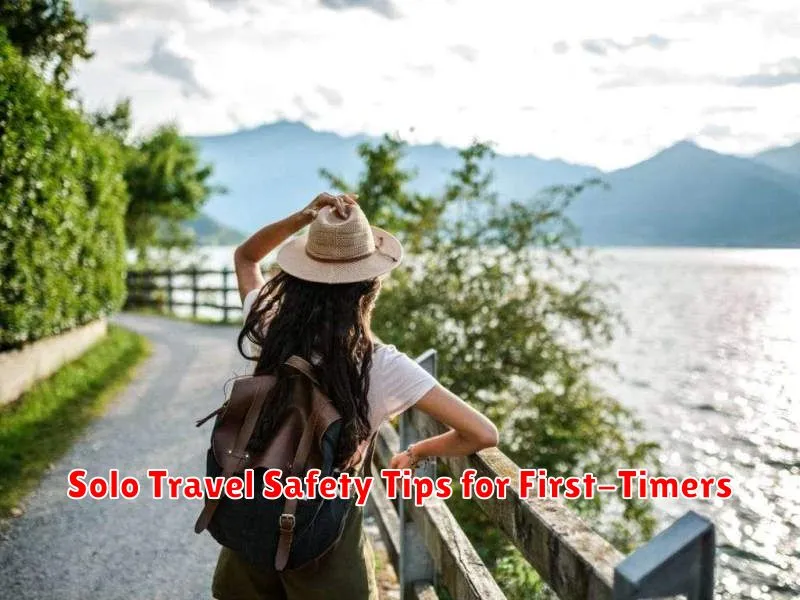Embarking on your first solo trip can be an incredibly rewarding experience, offering unparalleled freedom and opportunities for self-discovery. However, prioritizing safety is paramount, especially for first-time solo travelers. This comprehensive guide provides essential solo travel safety tips designed to empower you to navigate the world confidently and securely, ensuring a smooth and unforgettable adventure. From pre-trip planning to on-the-ground strategies, we’ll cover crucial aspects of solo travel safety, allowing you to embrace the excitement of independent exploration while mitigating potential risks.
Whether you’re dreaming of backpacking through Southeast Asia, exploring the vibrant cities of Europe, or immersing yourself in the culture of South America, understanding solo travel safety is key to a positive experience. This article addresses key concerns of first-time solo travelers, offering practical advice and actionable steps to enhance your safety throughout your journey. Learn how to prepare effectively, stay aware of your surroundings, protect your belongings, and connect with reliable resources, enabling you to focus on enjoying the unique benefits of solo travel.
Why Solo Travel Is Growing
Solo travel is experiencing a surge in popularity due to several converging factors. Independence and a desire for self-discovery are key drivers. Traveling alone allows individuals to set their own pace, pursue their specific interests, and truly connect with themselves and their surroundings without compromise. The ability to fully immerse oneself in a new culture or environment without the constraints of group travel is particularly appealing. This freedom to be spontaneous and embrace unexpected adventures is a powerful motivator for many solo travelers.
The rise of social media and online travel resources has also contributed to the growth of solo travel. These platforms provide a wealth of information, allowing individuals to research destinations, connect with other travelers, and book accommodations and tours with ease. Furthermore, the increasing affordability of travel, coupled with the availability of budget-friendly options like hostels and homestays, has made solo adventures more accessible to a wider range of people. This accessibility, combined with the desire for unique and personalized experiences, fuels the continued growth of solo travel.
Finally, a growing emphasis on personal well-being and self-care has also played a role. Solo travel can be a powerful tool for self-reflection and personal growth, providing opportunities for individuals to step outside their comfort zones, challenge themselves, and gain a new perspective on life. For many, it’s a chance to disconnect from the pressures of daily life and reconnect with their inner selves, leading to increased confidence and a stronger sense of self.
Researching Destinations for Safety
Safety should be a primary concern when planning any trip. Thoroughly research your potential destinations. Look into crime rates, political stability, and any recent safety advisories or travel warnings issued by your government. Consider the specific neighborhoods you plan to visit and research their safety reputations. Understanding the potential risks allows you to make informed decisions and take necessary precautions.
Utilize reliable resources for your research. Government websites, reputable travel guides, and online forums can provide valuable insights. Pay attention to local news outlets for up-to-date information on current events and safety concerns. Contacting your country’s embassy or consulate in your destination can also provide helpful guidance and support.
Beyond general research, consider your personal circumstances. Factors like age, health, and solo travel can influence your safety needs. Be aware of local customs and laws to avoid unintentional violations. Sharing your itinerary with someone at home and staying in regular contact can further enhance your safety while traveling.
Trusting Your Instincts Abroad

Traveling to a new country can be an exhilarating experience, but it’s essential to stay aware and trust your instincts. While embracing the unknown is part of the adventure, your gut feeling can often be a valuable tool in navigating unfamiliar situations. If something feels off or makes you uncomfortable, don’t dismiss it. Whether it’s a deserted street at night or a pushy vendor, it’s always better to err on the side of caution and remove yourself from the situation. Prioritizing your safety is key to having a positive and memorable trip.
Preparation plays a significant role in developing confident instincts. Researching your destination beforehand, including local customs, laws, and potential safety concerns, will empower you to make informed decisions. Learning basic phrases in the local language can also be incredibly helpful. Being prepared allows you to react more effectively to unexpected circumstances and trust your judgment in potentially challenging situations. It’s also important to keep your valuables secure and be aware of your surroundings.
Remember, trusting your instincts doesn’t mean being constantly fearful or avoiding new experiences. It simply means being mindful and aware. It’s about listening to that inner voice and taking appropriate action when necessary. This can range from simply choosing a different route to contacting local authorities. By combining a sense of adventure with healthy caution and informed intuition, you can fully enjoy the enriching experience of traveling abroad.
Staying in Safe and Reviewed Accommodations
Choosing safe and reputable accommodations is paramount for a positive travel experience. Prioritize lodgings with verified reviews from previous guests. These reviews provide valuable insights into the property’s safety, cleanliness, and overall quality. Look for establishments that clearly outline their security measures, such as surveillance systems, well-lit common areas, and secure access controls. Licensed and regulated accommodations are also more likely to adhere to safety standards.
Research the neighborhood surrounding your potential accommodation. Look for areas known for their low crime rates and proximity to emergency services. Understanding the local environment helps ensure a safer and more comfortable stay. Consider contacting the accommodation directly to inquire about specific safety protocols and procedures they have in place. This proactive approach can offer added peace of mind.
When booking online, use secure booking platforms and verify the legitimacy of the listing. Be wary of unusually low prices or requests for payment outside of established channels. Double-check the accommodation’s address and contact information. Upon arrival, familiarize yourself with emergency exits and safety procedures outlined by the property. Keep valuables secured and report any suspicious activity to the appropriate authorities.
Avoiding Over-Planning or Over-Sharing
Over-planning can create rigid expectations that lead to disappointment when unforeseen circumstances arise. While preparation is important, excessive planning can stifle spontaneity and adaptability. Similarly, over-sharing, particularly in professional or new relationships, can create discomfort and erode trust. Striking a balance between preparedness and flexibility, and between appropriate disclosure and privacy, is crucial for healthy relationships and successful endeavors.
Focus on planning the essential elements, leaving room for adjustments and improvisation. When sharing information, consider your audience and the context. Ask yourself if the information is necessary, relevant, and appropriate for the situation. Prioritize building trust gradually through reciprocal sharing, rather than overwhelming others with excessive details upfront.
By avoiding these extremes, you can foster stronger relationships, navigate challenges more effectively, and cultivate a greater sense of ease and authenticity in your interactions.
Staying Connected to Family and Friends
In today’s fast-paced world, staying connected with loved ones can be challenging. Prioritizing these relationships is crucial for our well-being. Regular communication strengthens bonds and provides essential emotional support. It’s about making the effort, whether it’s a quick phone call, a video chat, or a simple text message.
Technology plays a significant role in maintaining connections across distances. Social media platforms, messaging apps, and email make it easier than ever to share updates and stay involved in each other’s lives. However, it’s important to remember that in-person interaction remains invaluable. When possible, plan visits, outings, or gatherings to foster deeper connections.
Finding ways to connect doesn’t have to be complicated. Simple gestures like sending a handwritten card, sharing a meal together, or reminiscing about shared memories can go a long way. The key is to make time and be present in your interactions, showing your family and friends that you value their presence in your life.
Handling Unfamiliar Situations Confidently

Encountering the unknown is a part of life. Whether it’s a new job, a social gathering with strangers, or an unexpected challenge, navigating unfamiliar territory can be daunting. The key to handling these situations confidently lies in focusing on preparation, mindset, and adaptability.
Before stepping into a new situation, gather as much information as possible. Research the context, anticipate potential challenges, and consider possible responses. If you’re starting a new job, understand the company culture and expectations. If you’re attending a social event, learn about the dress code and who will be there. While you can’t predict everything, preparation builds a foundation of knowledge and reduces anxiety. Cultivate a growth mindset. View the unknown as an opportunity to learn and expand your horizons. Embrace challenges as chances to develop new skills and gain valuable experience. Remember that discomfort is often a sign of growth.
Finally, be adaptable. Things rarely go exactly as planned, so be prepared to adjust your approach as needed. Active listening and observation are crucial in unfamiliar situations. Pay attention to social cues, be open to new information, and be willing to change course if necessary. By embracing flexibility and focusing on the present moment, you can navigate even the most unpredictable situations with confidence.

